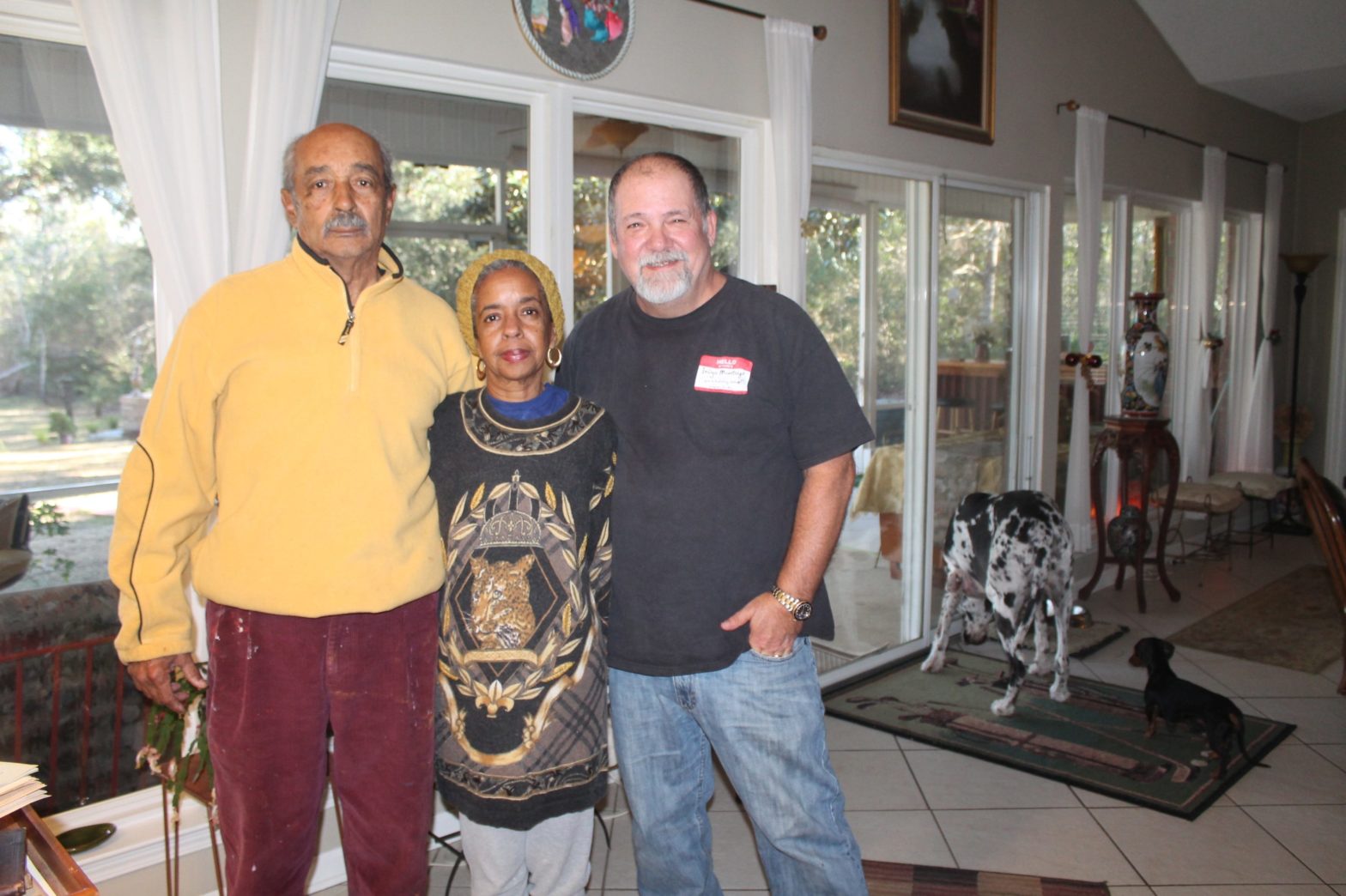![Jawana Jackson and her husband, James Richie, left, moved to Milton in July of 2017 and found a friend in Tom Stewart. Pictured also are Jackson's great Dane Rambo and Stewart's Dachsund, Boo. [AARON LITTLE | Press Gazette]](http://127.0.0.1/wordpress/wp-content/uploads/2022/01/ghows-DA-62e7d790-fe35-3240-e053-0100007f2f6c-1dff202a-scaled.jpeg)
MILTON — Many know Dr. Martin Luther King Jr. as a world civil rights leader. Milton resident Jawana Jackson knew him as Uncle Martin.
TEA AND MUD CAKES
Jackson's family briefly shared their home in Selma, Ala. with King. He lived there while planning the 1965 Selma to Montgomery March. Jackson’s mother, Richie Jean Sherrod Jackson, was a childhood friend of King’s wife, Coretta Scott King, so the families were close.
"That friendship led to him asking my parents if he could stay with us in Selma at our home as he planned the Selma to Montgomery march in 1965," Jackson said. The four-day march led to the 1965 Voting Rights Act.
"I was four and five (years old)," Jackson said. "I wish I had been just a little bit older to fully understand the gravity of what was happening for America and our citizens … One thing I do know, the '60s were a turbulent time in this country but it was a time that produced tangible results for America.
"Dr. King believed that any country where its citizens were denied the right to vote was a country that denied democracy. The 1965 Voting Rights Act produced a situation where every American would be allowed the right to vote."
As a child, Jackson had a different perspective on King.
"I didn’t know him as the world leader," she said. "I knew him as the man, Uncle Martin, that read me bedtime stories, and I knew him as the Uncle Martin that one day had tea and mud cakes with me in the house. I knew him as someone who always took time with me even though there would be other world leaders in the house and other issues he was addressing."
Because King had four children of his own, Jackson said he was always sensitive to children.
"I can always remember him reading to me," she said, "and emphasizing the importance of education and emphasizing the importance of reaching out and touching other people and understanding other people and making this world a better place for all.
WORLD LEADERS FOR HOUSE GUESTS
While Jackson was too young to understand who was in her home, her parents were well aware.
"For over two days, the Jackson home, my parents’ home, was the place where the first two African American Nobel Peace Prize recipients, Dr. Ralph Bunch and Uncle Martin, Dr. Martin Luther King Jr. resided," Jackson said.
Jackson's mother often told the story of waking up her husband, Dr. Sullivan Jackson, a dentist, to talk about their house guests.
"She woke my father up in the middle of one of the nights just remarking how they had these two world-renowned leaders in the home with me. I was 4 at the time … My father remarked, ‘Is there anything Dr. Bunch needs?’ and my mother said, ‘No.’ (He asked,) ‘Is there anything Martin needs?’ ‘No,’ (she said). ‘Well, we need to get back to sleep because tomorrow is going to be another hectic day,’ (he said)."
A few years later, Jackson and her family were eating at the dinner table when they heard the TV news report King’s April 4, 1968, assassination in Memphis.
"My parents and I were speechless," Jackson said.
While the world mourned the loss of a leader, the Jacksons grieved for a friend.
A NEW CAREER
Jackson, who graduated from Fisk University in 1981 with a bachelor’s degree in psychology and master’s work in gerontology, said her career started with one phone call.
"Never did I in my wildest dreams think that I would have a telephone conversation with Mrs. King one night, who was also living in Atlanta, of course," Jackson said. "She and I had not talked in a number of years. She asked about my parents and a few hours later I was hired at the (The Martin Luther King, Jr. Center for Nonviolent Social Change). For 10 years I served as director of Visitor Services under Mrs. King and worked with this phenomenal woman for 10 years of my adult life."
Jackson had no experience with public speaking but quickly acquired the skill when tours came to the center. Coretta King tasked her with speaking; when she expressed reservations, King told her, "If you don’t tell your story, who will?"
OPENING A MUSEUM
"After my last parent’s death, I made the decision that the Jackson home was no longer just my childhood home," Jackson said. "It was a place that the world needed to see and touch. So I created (The Sullivan and Richie Jean Sherrod Jackson Foundation and Museum Inc.) in order to support the ongoing, and preservation of a unique, piece of American history."
The museum covers more than King and his legacy.
"(It’s) also the place that has a rare art collection done by my grandmother who at the age of 70 had never picked up a paintbrush," Jackson said, "and for the next 25 years created original oil paintings. It also has a rare book collection of over almost 2,000 rare books that date back to the early 1800s in this country.
"Once you visit the Jackson Museum, you're going to touch every piece of Americana, music, education, social justice, the arts. So it's a very unique and special private residence."
Jackson and her husband, James Richie, moved to Milton in July of 2017. She still pursues King's dream.
"Our country is its strongest when we all work together; when we all realize our connectivity," she said. "That is the beauty of America.
"It is the beauty of the United States."







This article originally appeared on Santa Rosa Press Gazette: Remembering 'Uncle Martin'
